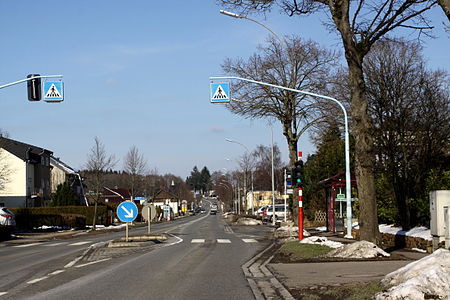The German-Luxembourg Nature Park (German: Deutsch-Luxemburgische Naturpark) is a cross-border nature park, which was established on 17 April 1964 by state treaty between the German state of Rhineland-Palatinate and the Grand Duchy of Luxembourg. It thus became the first cross-border nature park in Western Europe.
On the German side Naturpark Südeifel is providing services for visitors.The park covers an area of 789 km² along the northern German-Luxembourg border, of which 432 km² are on the Rhine side and 357 km² on the Grand Duchy side. In Germany, the area of the park is identical with the South Eifel Landscape Park (German: Naturpark Südeifel) established in 1958, while the greater part of the Luxembourg side coincides with the Our Landscape Park (German: Naturpark Our, French: Parc naturel de l'Our).
The park covers the Our river valley separating the two countries and the low mountains of the Ardennes from the Eifel, in its southern part there is a region known as Little Luxembourg Switzerland (Luxembourgish: Kleng Lëtzebuerger Schwäiz, German: Luxemburger Schweiz, French: Petite Suisse luxembourgeoise). The attractions of the park include numerous monuments (e.g. Vianden Castle, former monastery in Echternach), villages and towns, river valleys with numerous waterfalls, mills and geological formations, forests, cultural heritage (the dancing procession in Echternach is inscribed on the UNESCO Intangible Heritage List). Within the park, 25 nature reserves and numerous other forms of nature protection have been established.











